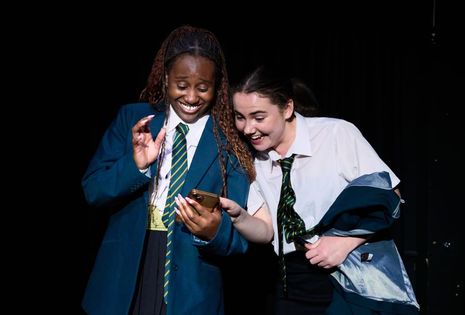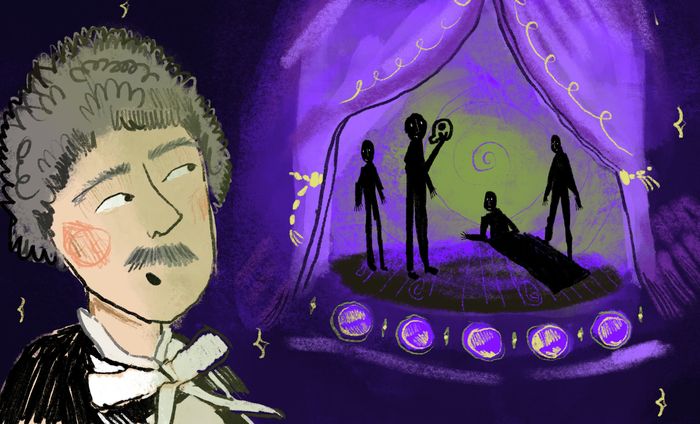Loos Loos: an unflinching gaze at teenage girlhood
Alex Brian sits down with Ella Thornburn and Maya Calcraft to discuss the development of this exceptional Fringe show

Amid the cacophony of shows flyering on Edinburgh’s Royal Mile, a toilet. Throw a sweet into the bowl and you could be the lucky winner of a bag of Haribos and a flyer for Cambridge-born Fringe show Loos Loos. The play follows two teenagers, Lou (Bella Ofo) and Freya (Isobel McNerney), whose friendship takes a hit after Lou is assaulted at a party. Tallulah (yes, the toilet has a name) plays a starring role as the entire story unfolds in the school toilets – the only place the girls feel safe being themselves. I spoke to director Maya Calcraft and co-writer and producer Ella Thornburn about the work that went into capturing “the lose, lose situation” of teenage girlhood.
“You can say a lot in a short amount of words without it hopefully being too triggering or intense”
“It was never a solid plan of, ‘Oh, why don’t I write a play in a toilet? ’” Ella recalls. Alongside Grace Boag-Matthews, she began crafting the script when she was just 15. The start was the easiest: “We literally had conversations with each other and then wrote them down.” These funny yet intimate dialogues closely resembled the chats they remember having in school toilets. And so, the setting was born. The liminal space of the cubicles also mirrors the “weird limbo” between childhood and adulthood in which the characters find themselves, not to mention that “a lot of the play is really gross.”
Nor did the pair set out to write about assault. However, since so many of their conversations centred around casual misogyny – such as boys ranking the girls in their class – the topic seemed impossible to ignore. The inclusion of an assault midway through the play created a huge shift, which Maya had to navigate. “What really worked was leaning massively into that change and shaping the pacing around it,” she explains. Poems are used to integrate serious introspection into a play initially dominated by comedic dialogue. Ella reveals why: “You can say a lot in a short amount of words without it hopefully being too triggering or intense.”
“There are things I would have done differently, but, at the same time, we weren’t able to have those conversations as teenagers”
The poems also allow Lou to express her true feelings, which she has difficulty sharing with Freya. For Ella, Lou’s struggle to find words for her experience is the crux of the play. This focus emerged from the writers feeling they lacked the authority to portray a universal experience of assault. Yet they refused to shy away from the issue. Instead, scenes repeat to show how the friends could have communicated differently. A bra sits in the toilet from the outset, symbolising the ever present threat of violence. The moment is signalled by Lou picking up the bra, foregrounding assault as something you carry on your body.
A criticism the show has received is whether this focus on the unvoiceable hinders discussions of feminism and misogyny. “Looking back now, there are things I would have done differently,” Ella admits. “But, at the same time, we weren’t able to have those conversations as teenagers”. Having started writing at that age, Ella knows how adolescents tackle these issues. Indeed, the play largely draws on personal experience: “The characters were basically copies of myself and the co-writer for a long time.”
The only major change they made when redrafting was to the ending: Lou stands alone, her friendship unrepaired. In reality, Maya argues, “things are often frustratingly incomplete”. Nevertheless, Ella makes one thing clear: “I don’t want people to come away from it thinking the message is that your friendship can’t endure through a really difficult or traumatic event.” Rather, Ella hopes audiences learn the value of open conversations and recognising that you cannot always understand what someone is going through.
“Exploring shame meant including all the scenes they were embarrassed to show their co-writer”
Often what inhibits these conversations is a sense of shame, which Ella notes was “the first theme we knew we were writing about.” For the playwrights, exploring shame meant including all the scenes they were embarrassed to show their co-writer. But shame affected the actors too. Maya explains how she bridged these feelings through conversations about school experiences and the TV drama Adolescence. “Putting a pad on, putting a tampon in: those moments we basically didn’t touch until opening night,” she recalls. Nevertheless, Bella and Isobel were “very fearless,” allowing the show to get “more and more gross as we went on.”
There is one kind of shame we have yet to address: the awkwardness of lugging a porcelain toilet through Queens’ in the middle of exam term. Why a porcelain toilet, you may ask? Maya has an axiom for the ages: “If you’ve got a wall and a toilet, don’t skimp on the toilet.” The team then had to manoeuvre said toilet up and down the stairs to Clover Hall every day for two weeks straight.
One can only hope it was worth it for the conversations sparked and taboos broken. Ella certainly seems to think so: “It was really strange watching people come out of the audience, and a lot of them would be in tears, or they’d be chatting with their friends, saying, ‘Oh my God, I’ve had that conversation! ’” This relatability is what helped the show stand out amid the thousands of others at Fringe – that and the sweet-filled toilet, of course.
 News / Right-wing billionaire Peter Thiel gives ‘antichrist’ lecture in Cambridge6 February 2026
News / Right-wing billionaire Peter Thiel gives ‘antichrist’ lecture in Cambridge6 February 2026 Features / From fresher to finalist: how have you evolved at Cambridge?10 February 2026
Features / From fresher to finalist: how have you evolved at Cambridge?10 February 2026 Film & TV / Remembering Rob Reiner 11 February 2026
Film & TV / Remembering Rob Reiner 11 February 2026 News / Churchill plans for new Archives Centre building10 February 2026
News / Churchill plans for new Archives Centre building10 February 2026 News / Epstein contacted Cambridge academics about research funding6 February 2026
News / Epstein contacted Cambridge academics about research funding6 February 2026










